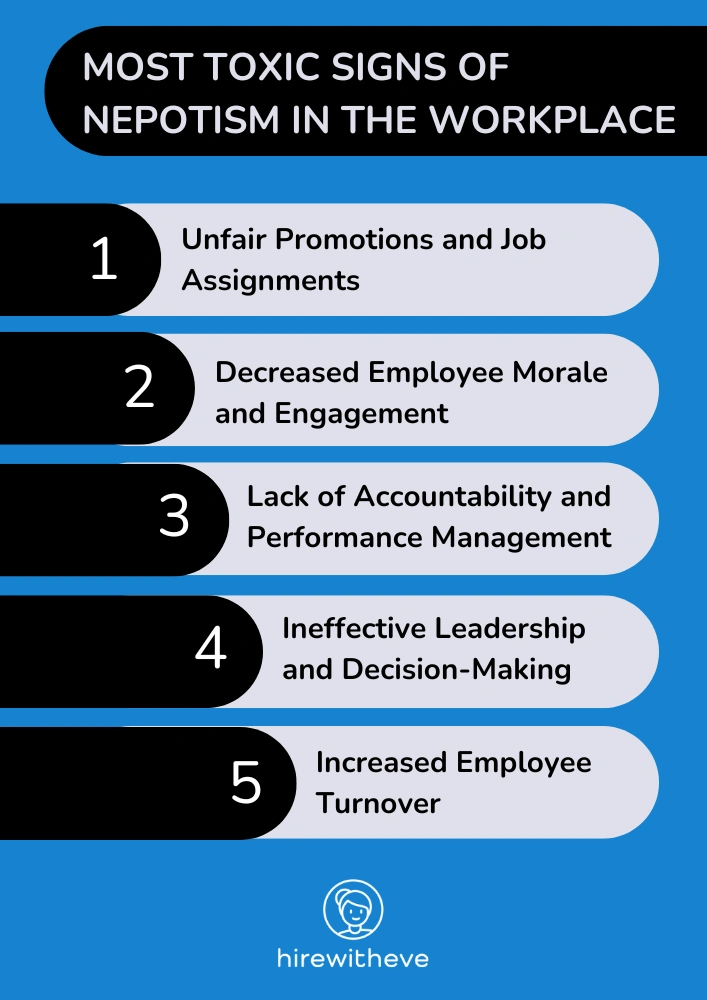Nepotism in the Workplace: Identify the 5 Toxic Signs

Nepotism in the workplace is a term that strikes fear and frustration in the hearts of many employees. It refers to the practice where family members, close friends, or individuals with personal connections are given preferential treatment in hiring, promotions, or other opportunities, regardless of their qualifications. While this may seem harmless in small doses, when left unchecked, nepotism in the workplace can create a toxic environment, damage team morale, and lead to organizational dysfunction.
In this article, we will identify the five most toxic signs of nepotism in the workplace, discuss how they negatively impact the organization, and explore the long-term consequences of allowing such practices to thrive.
Table of contents
What is Nepotism in the Workplace?
Before diving into the toxic signs, it's essential to define what nepotism in the workplace truly is. Nepotism occurs when individuals with connections to powerful people within an organization — such as family members or close associates—receive privileges that others do not. This can range from receiving promotions without merit, preferential treatment in day-to-day tasks, or even being hired over more qualified candidates.
Nepotism in the workplace fosters inequality and creates an unbalanced environment where employees feel undervalued. Over time, this practice can degrade trust, foster resentment, and hinder the overall growth of the company. Understanding how to spot these signs early is crucial for HR managers and talent acquisition specialists to maintain a healthy and fair organizational culture.
What are the five most toxic signs of nepotism in the workplace?

Unfair Promotions and Job Assignments
One of the most apparent signs of nepotism in the workplace is unfair promotions and job assignments. Employees who are connected to higher-ups often receive promotions and prime responsibilities without necessarily demonstrating the skills, performance, or qualifications required for these roles.
For example, you might notice that a less experienced employee with personal connections is promoted over more competent colleagues who have demonstrated consistent performance. When this happens, it not only demoralizes hardworking employees but also hinders the growth and development of the company. Leaders must ensure that promotions and job assignments are based on merit, not favoritism.
Decreased Employee Morale and Engagement
Nepotism in the workplace can have a devastating effect on employee morale and engagement. When employees see that merit and hard work are being overshadowed by personal connections, they become disengaged, feeling that their contributions are not valued.
Research has shown that employee morale directly impacts productivity. In a company where nepotism is rampant, disengagement leads to a lack of motivation to go above and beyond. Employees start to perform just the minimum required, as they feel there’s no reward for excellence.
The ripple effect of low morale can be long-lasting and can even spread across departments, affecting the entire organization. Leaders must pay attention to engagement levels and root out any practices of nepotism that could be harming their teams.
Lack of Accountability and Performance Management
Another clear sign of nepotism in the workplace is when certain individuals are not held accountable for their performance. Employees with personal connections to leadership may receive more leniency when they underperform, miss deadlines, or break company policies.
For example, a team member who is consistently missing project deadlines might face no consequences simply because they are related to someone in management. This creates an unfair work environment and sends the message to other employees that favoritism overrides accountability.
Accountability is crucial in maintaining the quality of work and fairness within an organization. If some employees are not held to the same standards as others, it weakens the integrity of performance management processes and creates a toxic work culture.
Ineffective Leadership and Decision-Making
Nepotism in the workplace often leads to poor leadership decisions, as individuals in management positions may lack the necessary skills and experience. When those in leadership roles are promoted because of their connections, their decision-making processes may be compromised.
Ineffective leadership not only undermines the efficiency of operations but also causes long-term damage to the company’s reputation. Poor decisions, whether related to strategy, personnel, or resource management, can lead to losses in revenue, decreased client satisfaction, and potential legal issues.
Moreover, when employees observe that leadership positions are not earned based on merit, it diminishes respect for the company’s hierarchy and management structure. This can erode trust in the leadership team and lower overall organizational cohesion.
Increased Employee Turnover
Nepotism in the workplace often results in higher employee turnover rates. Employees who feel overlooked, undervalued, or frustrated by the preferential treatment of others are more likely to seek opportunities elsewhere. As turnover increases, the organization incurs significant costs in hiring, onboarding, and training new staff, not to mention the loss of valuable knowledge and expertise.
High turnover due to nepotism can create a revolving door of talent, making it difficult for the company to maintain consistent performance and morale. Additionally, frequent turnover reflects poorly on the company’s culture and leadership, making it harder to attract top talent.
HR managers and talent acquisition specialists need to be particularly vigilant about addressing nepotism, as it can undermine the overall hiring strategy and long-term retention goals. Organizations that create a culture of fairness and merit-based recognition are much more likely to retain high-performing employees.
Conclusion
Nepotism in the workplace is more than just a minor inconvenience — it’s a serious issue that can have a lasting negative impact on an organization. The five toxic signs outlined in this article — unfair promotions, decreased employee morale, lack of accountability, ineffective leadership, and increased employee turnover — can all signal that nepotism has taken root within a company. Left unchecked, these practices can lead to widespread dissatisfaction, loss of productivity, and difficulty in retaining top talent.
For HR managers and talent acquisition specialists, it’s essential to identify and address these signs early on to foster a fair and equitable work environment. Creating transparent processes for promotions, holding all employees accountable for their performance, and maintaining merit-based leadership decisions are critical steps in combating nepotism in the workplace. By doing so, companies can ensure a positive culture that values all employees equally, leading to long-term success.
Target Your Talent
Unlock tailored solutions for your recruitment and hiring needs with Eve Platform's extensive case study library.
Subscribe now to enhance your HR expertise and excel in your role.
Free Resources

Transforming Hiring: 7 Key Recruiting Metrics
Enhancing recruitment processes with data-driven insights for better hiring outcomes.

Reducing Hiring Bias with Hirewitheve.
Utilizing Hirewitheve to combat bias and streamline recruitment processes effectively.

Hiring Detail-Oriented Candidates
HirewithEve enhances hiring by accurately assessing candidate's attention to detail-oriented.








